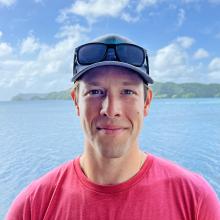
Charlie Brooks
Tell us about your work/research. What kinds of things do you do?
I assist in piloting and maintaining some of our labs robotic systems and generally helping with field work.
What sparked your initial interest in your career?
I have lived around the ocean my entire life and grew up sailing, surfing, fishing, and just generally being on the water. It has always fascinated me and been a part of my life. Coming out of college the biggest thing I wanted to do was be in the field, which led me to spend four years sailing on the research vessels operated by SIO.
Who influenced you or encouraged you the most?
My family, particularly my mother, has always encouraged me to chart my own path through life and follow my interests.
What element of your work/study do you think is the most fascinating?
The element that I love the most about my current role is learning to pilot and maintain different autonomous robotic systems.
What other jobs led you to your current career?
I graduated college thinking I wanted to work in fisheries policy, but a found love of working with my hands to design and build things led me to seek to combine my fascination with ocean science with a desire to work hands on. Through college and afterwards I worked a variety of jobs from a mate on a former America's Cup yacht, to building out the electrical systems on sport fishing boats. All of that led me to the most significant job of my early career, becoming a oceanographic research technician at SIO. I was fortunate to spend four years predominantly attached to R/V Roger Revelle, which set me for my current role working with autonomous systems with a larger engineering focus.
What are your degrees and certifications?
Bachelor of Science in Marine Affairs - University of Rhode Island 2015
What are your hobbies?
I love to surf, scuba dive, snorkel, fly fish, hike, camp, take photographs, and generally be outside and in the water.
What advice would you give someone who wants to have a career like yours?
There are a lot of opportunities to get involved with marine science and shipboard work at a variety of different education levels. Figure out what excites you, build a network, look for volunteer/internship opportunities, and always be open to learning something new.
Expeditions
Charlie participated in the following Ocean Exploration Trust expeditions:
